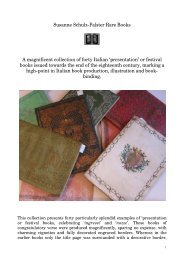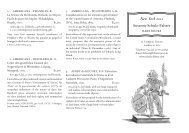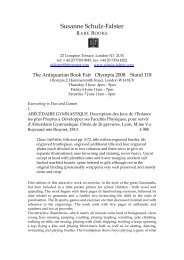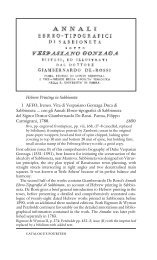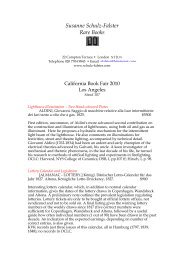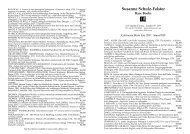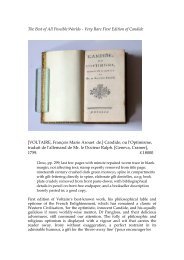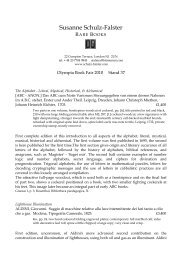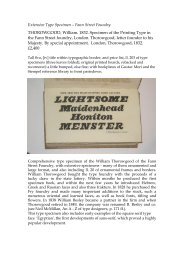Susanne Schulz-Falster Catalogue Ten - Schulz-Falster Rare Books
Susanne Schulz-Falster Catalogue Ten - Schulz-Falster Rare Books
Susanne Schulz-Falster Catalogue Ten - Schulz-Falster Rare Books
You also want an ePaper? Increase the reach of your titles
YUMPU automatically turns print PDFs into web optimized ePapers that Google loves.
lating the price of a horse dependent on its life expectancy. Numerous<br />
Xourishes adorn the pages, and especially towards the end the student appears<br />
to have concentrated mostly on how to incorporate satirical proWles<br />
into the design of his elaborate parentheses.<br />
74 CLAPAREDE, David. Considerations sur les Miracles de<br />
l’Evangile, pour servir de Response aux DiYcultés de Mr. J. J.<br />
Rousseau dans sa 3.e Lettre Ecrite de la Montagne. Geneve, Claude<br />
Philibert, 1765. £280<br />
8vo, pp. xi, [I], 251; uncut in the original marbled wrappers, rebacked<br />
and somewhat dog-eared; with bookplate of H. Tronchin on front<br />
paste-down.<br />
First and only edition of Claparede’s well-reasoned critique of Rousseau’s<br />
theories on miracles. Claparede (1727–1801), Genevan professor of theology,<br />
maintains ‘Rousseau n’admet ni ne rejette les miracles; il nie que notre<br />
Seigneur les ait emplyés comme une preuve de sa mission; il entasse des<br />
diYcultés contre ce genre de preuve; quelquefois même il emplye la raillery,<br />
cette arme favorit des Incrédules’ p. v–vi).<br />
Cioranescu 19716.<br />
The Newton-Leibniz Dispute<br />
75 CLARKE, Samuel. A Collection of Papers which passed<br />
between the late Learned Mr. Leibnitz, and Dr. Clarke, In the Years<br />
1715 and 1716. Relating to the Principles of Natural Philosophy<br />
and Religion. London, James Knapton, 1717. £950<br />
Two parts in one volume, 8vo, pp. [xiii], [iii] advertisements and errata,<br />
416, 46, [2] advertisements; the Wrst part in English and French on<br />
facing pages; occasional light browning to paper; contemporary full<br />
calf, sides with gilt and blind borders; spine gilt in compartments, with<br />
gilt-lettered spine label, head and tail of spine lightly rubbed, single<br />
worm hole to lower joint; a good copy.<br />
First edition of the famous correspondence between Leibniz and Clarke. It<br />
was started by Leibniz who had written to Caroline, Princess of Wales, in<br />
1715 maintaining that Newtonian physics was contributing to the decline of<br />
natural religion in England. This charge was taken seriously by Newton and<br />
his followers. Samuel Clarke (1675–1729) was chosen to respond to<br />
Leibniz, as being the one man in England qualiWed by suYcient knowledge<br />
of both physics and theology, although he most certainly took instructions<br />
from Newton himself. ‘The ensuing correspondence, contain[s] Leibniz’<br />
most penetrating criticism of Newtonian philosophy’ (DSB). The longstanding<br />
feud between Leibniz and Newton over the priority of the invention<br />
of the calculus was fuelled by Princess Caroline eschewing her earlier tutor,<br />
Leibniz, for Newton.<br />
Babson 229; Wallis 62.1.<br />
susanne schulz-falster rare books catalogue ten<br />
76 CLAUSEWITZ, Carl von. Vom Kriege. Hinterlassenes<br />
Werk. Erster Theil [–Dritter Theil]. Berlin, Ferdinand Dümmler,<br />
1832–34. £3800<br />
Three volumes bound in one, 8vo, pp. xxviii, 371, [1] imprint; vi, 456,<br />
[1] imprint, [1] blank; viii, 386, [1] imprint; contemporary half green<br />
roan, over ribbed cloth boards, spine gilt in compartments, gilt lettering<br />
and numbering directly to spine; an attractive copy.<br />
First edition of Clausewitz’s Philosophy of War. Less a manual of strategy and<br />
tactics, then a general ‘inquiry into the interdependence of politics and warfare<br />
and the principles governing either or both. War, Clausewitz (1780–<br />
1831) maintained, must always be regarded ‘as a political instrument’; for<br />
war, his most famous aphorism runs, ‘is nothing but politics continued with<br />
diVerent means’. His basic conception, that military decisions must always be<br />
subordinate to political considerations, is buttressed by the emphasis laid on<br />
morals and morale as the decisive factors in war. He therefore condemns all<br />
rigid blue-prints for campaigns and battles, [and] deWnes strategy as ‘a perpetual<br />
alternation and combination of attack and defence’.’ (PMM 297)



